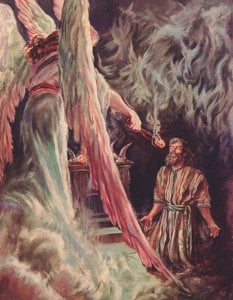Thursday: Isaiah’s Personal Yom Kippur
In Isaiah 6:1-6, Isaiah sees the heavenly King sitting on a throne in the temple, “high and exalted.”
The vision is a judgment scene that presents God as coming for judgment (Isa. 5:16). Isaiah beholds the true King, identified in the Gospel of John as Jesus Christ (John 12:41).
Even though Isaiah was God’s prophet and he called others to repentance, he understood that in God’s presence he is doomed. Confronted with God’s holiness and glory, Isaiah perceived his own sinfulness and also the uncleanness of his people. Holiness and sin are incompatible. Like Isaiah, we all need to come to the conclusion that we cannot pass through the divine judgment on our own. Our only hope is to have a Substitute.
What parallels to the Day of Atonement appear in Isaiah 6:1-6?
The combination of a temple filled with smoke, an altar, judgment, and atonement for sin and uncleanness, recalls strongly the Day of Atonement. Isaiah experienced his own “personal Day of Atonement,” as it were.
Functioning like a priest, a seraph (literally “burning one”) took a burning coal from the altar, presupposing some kind of offering, to purge the prophet’s sin. This is an apt image for the cleansing from sin that is possible through the sacrifice of Jesus and His priestly ministry of mediation. Isaiah recognized this as a cleansing ritual, and he kept still as the coal touched his lips. Thereby his “iniquity is taken away” and his “sin is forgiven” (Isa. 6:7, NASB). The passive voice in verse 7 shows that forgiveness is granted by the One sitting on the throne. The Judge is also the Savior.
God’s work of cleansing brings us from “Woe is me” to “Here am I, send me.” Understanding the heavenly work on the Day of Atonement leads to a readiness for proclamation, because a true understanding leads to assurance and surety. This is because we know that, in judgment, we have a Substitute, Jesus Christ, whose righteousness alone (symbolized by the blood) will enable us to stand without fear of condemnation (Rom. 8:1). Gratefulness motivates mission. Acquitted sinners are God’s best ambassadors (2 Cor. 5:18-20) because they know what God has delivered them from.


This is a vision to prepare Isaiah to take His message to Israel.
Isaiah accepts and does what the Lord wants.
What has this to do with Yom Kipper?
I do not know but the author probably only making a comparison.
Cleanliness of the high priest as commanded by God was part of the Sanctuary rituals. Should there not be some visible sign of spiritual humility and cleansing by a congregation before taking a seat at the Lord’s communion table?
In the past:Passover is now equiv to our communion service.
Fiftieth day celebration is now equiv to pentecost and the pouring out of the Holy Ghost on God’s people.
Yom Kipper/day of atonement is now equiv to (our time of atonement which started in Oct 22, 1844 and con’t. But this has to do with both physical and spiritual cleansing, all had to do what we are told in the bible before coming before a holy God.
We may not fully understand all the technicalities of the lesson, let us keep in mind the important point, that is the cleansing of the soul from sin. God, who is rich in mercy will help us to understand that which is necessary.